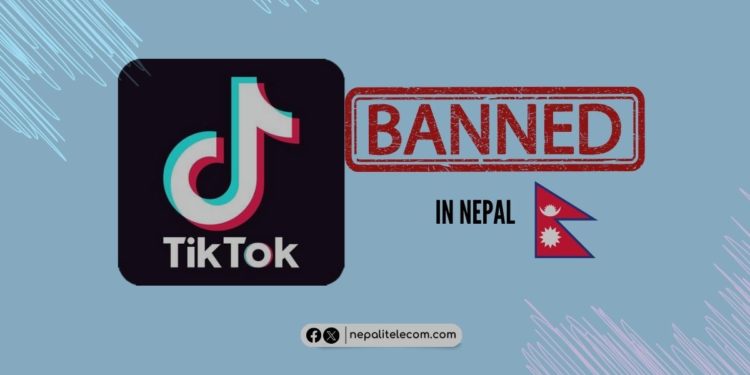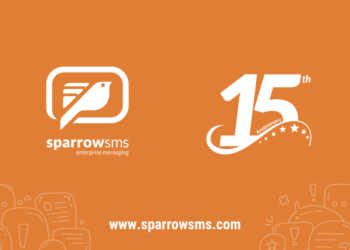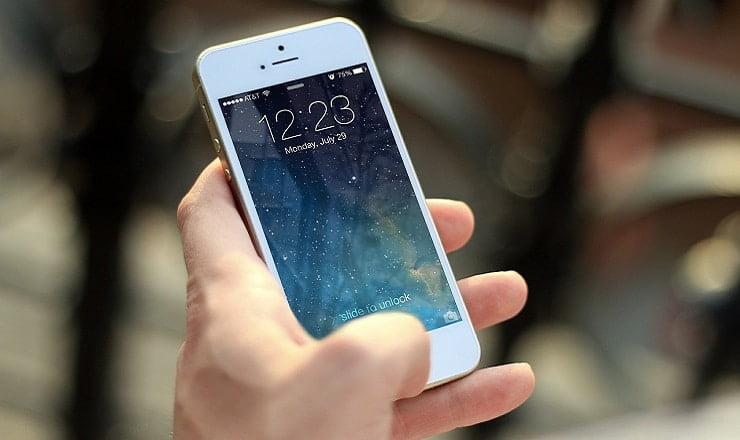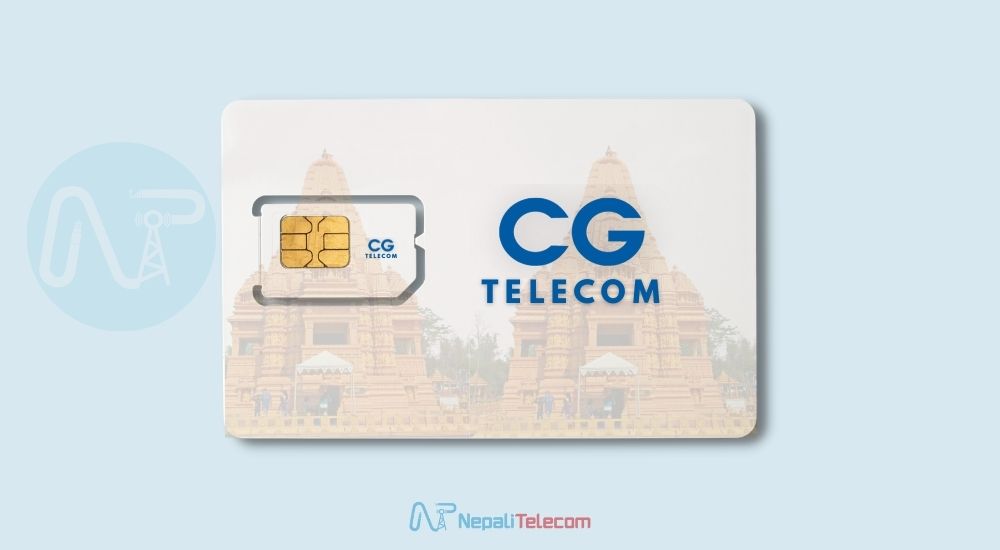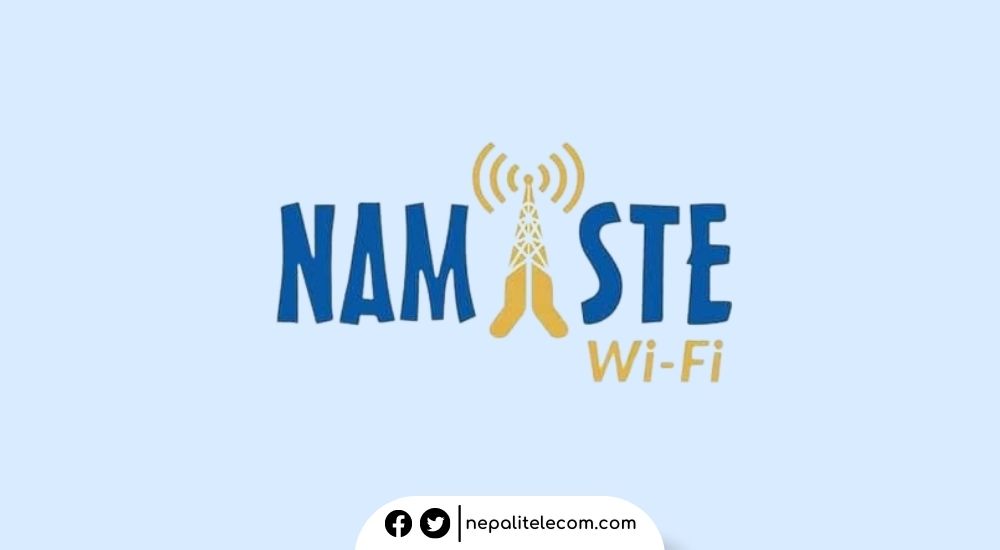It seems the banned video-sharing app TikTok will have plenty of difficulties in coming back live if it ever will. The Supreme Court has been hesitant in running a bench to debate the government’s ban on it. There are a total of 14 writs against the ban or to revoke it.
The government banned TikTok in Nepal citing “social damages”. Communication Minister Rekha Sharma said that a Council of Ministers’ meeting on Monday, November 13 (Kartik 27, 2080) made the decision. There were speculations about whether the app would face major scrutiny by the government. The decision still came as a shock and divided opinion among the netizens, experts, and the public. Now, both TikTok.com and TikTok mobile app are offline.
In the aftermath of the ban, the decision attracted a total of 14 writs. The SC had earlier designated a hearing for Mangsir 5, 2080. But a single bench of Justice Binod Sharma refused to issue an interim order. After that, two hearing dates on Mangsir 19 and 27 didn’t bring any results either. After that, the court fixed the hearing five months later for Baisakh 27, 2081. This time too, the court refrained from running a bench. Now the next hearing on TikTok ban writs will go ahead on Ashoj 10, 2081. This pushes the hearing for another five months. The court doesn’t seem to be in the mood to conduct a hearing on the ban.
The first “ominous” sign for the short-video sharing app
On November 06 (Kartik 20, 2080), the government issued a request for the public not to spread anti-social videos on TikTok and other social media. Releasing a notice, it said that the government was working closely with government agencies and the TikTok office in Singapore to delete compromising content on the Chinese video-sharing app automatically. At the time, many feared that a bigger decision could be on the way. This culminated in the complete block of access to TikTok across Nepal.
Similarly, the Ministry of Communication, Information, and Technology (MoCIT) released a notice indicating the TikTok ban in Nepal. The notice mentions that a meeting on Monday, November 13 (Kartik 27, 2080) decided to close down the app. The government decided that the app was “disrupting social harmony and affecting the social environment.”
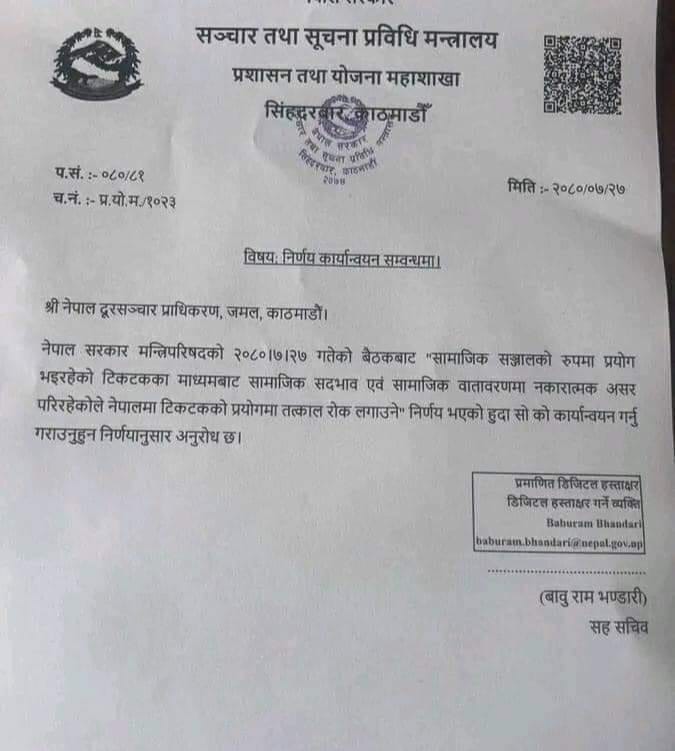
Government to ban TikTok in Nepal
TikTok.com and mobile app both go offline
TikTok.com AND TIKTOK MOBILE APP BOTH WENT OFFLINE soon after the government decree. While trying to access the page, the screen below is seen that says “This site can’t be reached”.
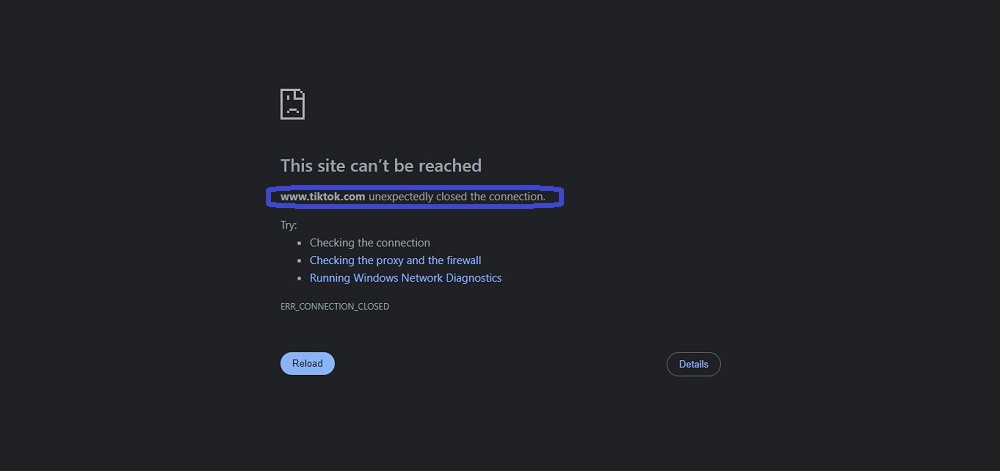
This happens when there is no internet access or some technical glitch has taken place. In today’s content, the government’s TikTok ban seems to be coming into effect already as the government said earlier today. However, it must be noted that the inability to access TikTok.com is service provider-specific. That is if your telecom company or ISP bans it then, you will be locked out of it.
After a few hours, the TikTok mobile app also went offline. After launching the app, it shows “No internet connection,”, and “Something went wrong.” ISPs and telecom companies first blocked the webpage and now the app which is used by most if not all has been pulled.
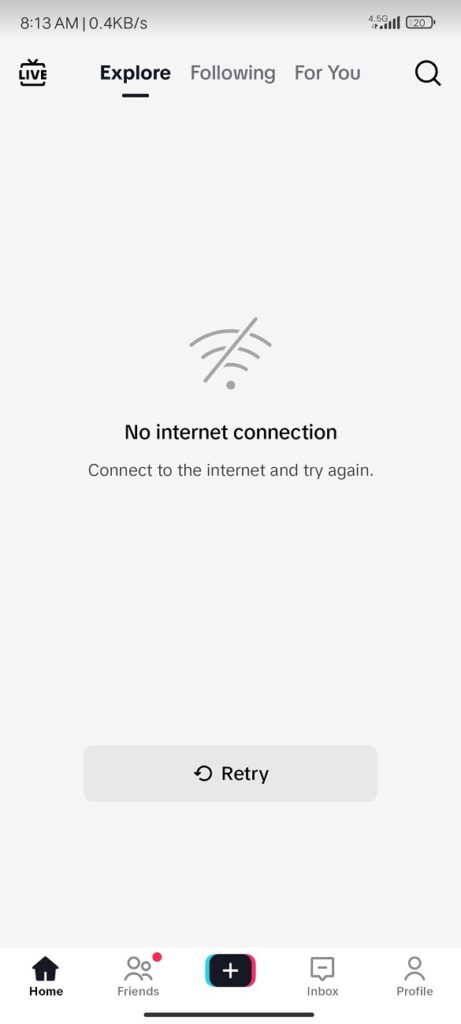
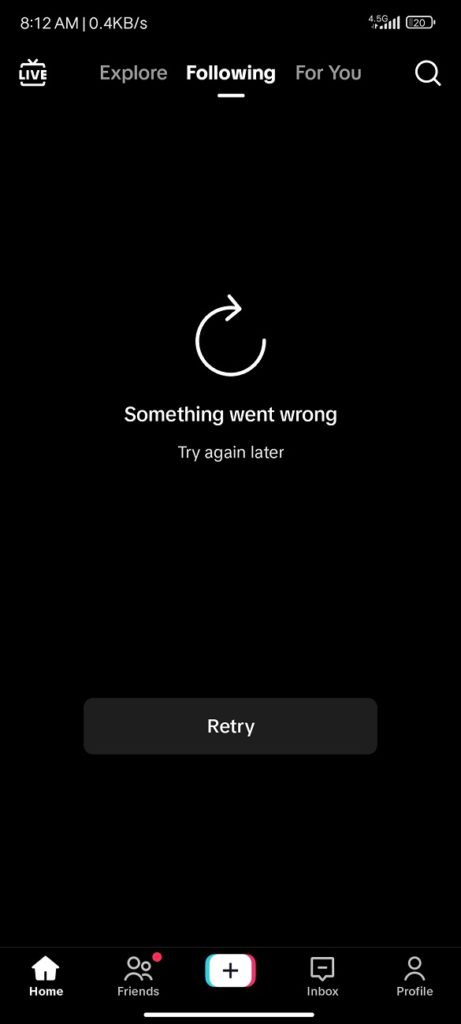
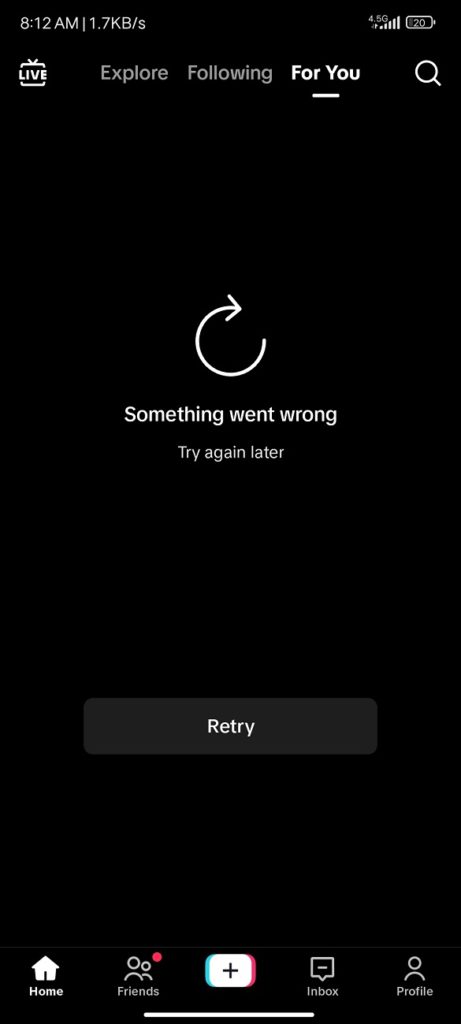
TikTok though is still visible on Play Store and App Store though. You can download the app too, however, it won’t run as the service providers have blocked the platform at the DNS level.
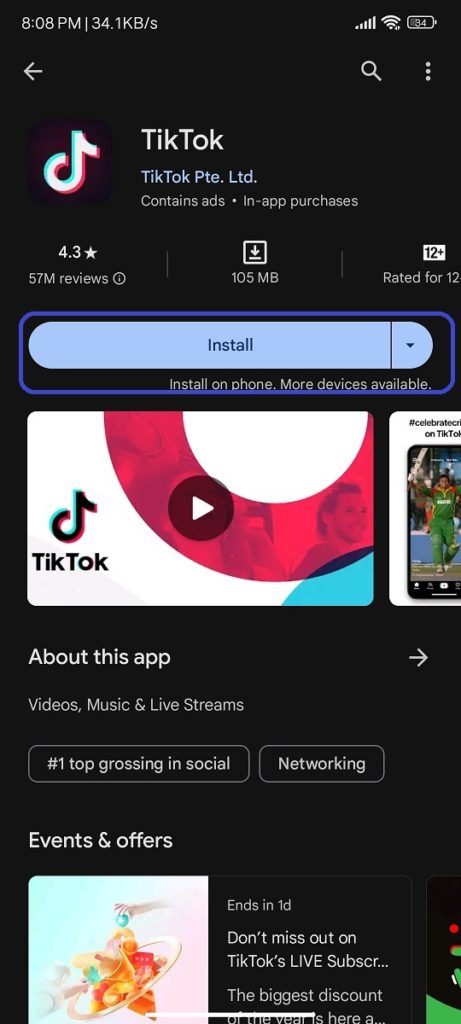
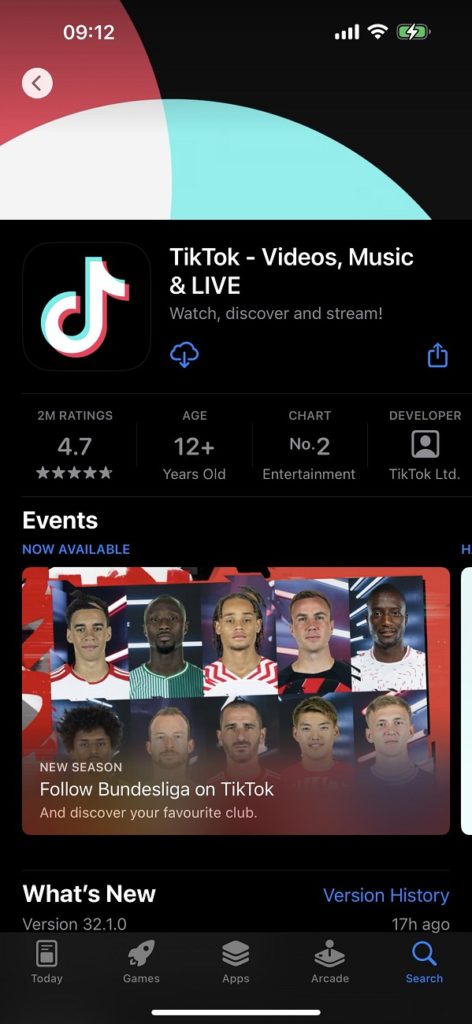
NTA goes full swing: Warns to implement the ban
Soon after making the decision, the government had Nepal Telecommunication Authority (NTA) direct telecom operators- Nepal Telecom (NTC), Ncell, and internet service providers (ISPs) to block users’ access to TikTok on their respective networks. The telecom regulator sent an email to all the communication service providers urging them to “immediately” implement the ruling made by the government. But as it emerged that some service providers “defied” the directive, the authority has warned of action if not adhered to soon. It’s taking a zero-tolerance policy on this move as it seems.
Earlier on Tuesday, November 14, ISPs started blocking TikTok on their network from 1 PM. The decision to do so was made after a meeting of the Internet Service Providers’ Association of Nepal (ISPAN) on the same day. As per the decision, all the ISPs blocked users’ access to TikTok on their networks by blocking TikTok’s DNS.
Later, after it emerged that the app was still operational on some service providers’ networks, the government told ISPs to stop users’ access to the video-sharing platform. The authority warned that if they continue to allow the “blocked” social network, they will be subject to action in accordance with Section 47 of the Telecommunication Act, 2053.
Tiktok’s local cache server is not installed in Nepal so ISPs and telcos have resorted to blocking TikTok’s DNS which have kept users out of access to the video-sharing app. With this, users of ISPS such as Vianet, WorldLink, Classic Tech, etc. won’t be able to use TikTok on their devices.
You may also want to read: PM Dahal: NTA’s TERAMOCS Monitoring System “Won’t Be Implemented”
TikTok Ban in Nepal Time!
After the government’s decision, TikTok was banned in Nepal from Monday, November 13 (Kartik 27, 2080). Sharing the government’s decision on the same day, Home Minister Narayan Kaji Shrestha had said that the process to disable the app in Nepal would take around one and a half hours and after that, the access to the app will shut down in Nepal. He said that the decision would help contain illicit activities and content that weakened social harmony and promoted communal conflict.
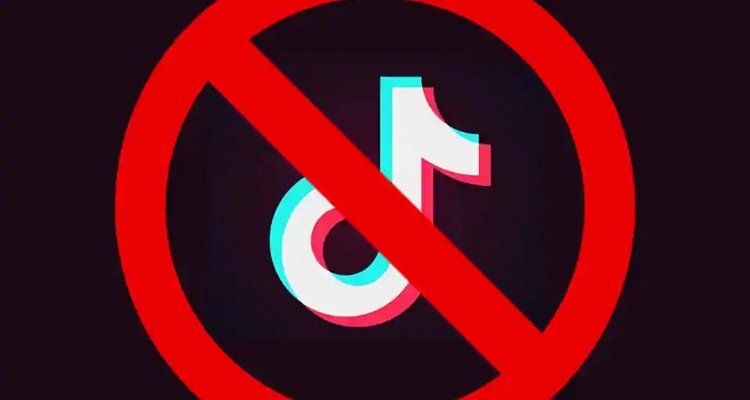
In the meantime, Communication Minister Ms. Sharma had said that the implementation of the ban might take some time depending on the technical feasibility. However, she shared that the decision was to “immediately” ban the app. “Technically, it will take some time to implement the decision to ban TikTok, but it has been decided to block it “as soon as possible,” Ms. Sharma said. Now, as you see in the above images, the TikTok ban in Nepal has already been implemented partially from around 8:00 PM on Monday, November 13, and might come into full effect very soon.
Do read: OAG Directs Nepal Government To Regulate Social Media And OTTs
The decision has divided the public
No sooner had the government’s decision been announced by the Communication Minister Ms. Sharma, Nepali social media went abuzz with remarks and opinions from the netizens. Some have openly embraced the decision with meme feasts while others have wished for a reconsideration. TikTok is awfully popular, that is at least safe to say and the decision to ban it has sent Nepali internet and public space into a frenzy.
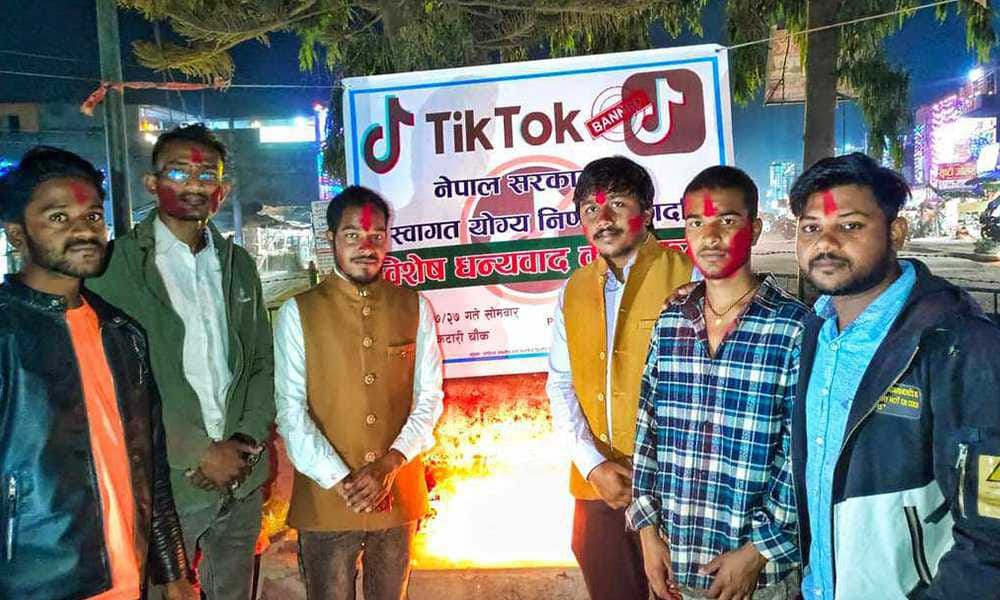
Who said what?
Gagan Thapa, a prominent Nepali Congress leader, couldn’t help but criticize the government’s decision. Sharing his view on X (formerly Twitter), he stressed the need to discourage the misuse of social media through federal regulation however, he declared that the decision to shut down the app’s access was an “opposite direction.” He also questioned the intention of the government and shared that this could be an attempt to clamp down on the freedom of expression. Mr. Thapa strongly demanded that the government reverse this decision.
Similar sentiments were shared by former Communication minister and CPN-UML party member Gokul Bastola. Through his post on X, he voiced his displeasure at the decision to block TikTok. He suggested that the government resort to content filtering law to curb any anti-social activities on the popular social media platform. He described TikTok as a platform for healthy personal entertainment where there’s a space for creativity. Baskota has long been an advocate of regulating social media in Nepal. His attempt to bring social media within federal regulation was severely criticized during his tenure.
TikTok ban to strengthen social harmony: PM Dahal
The honorable Prime Minister Pushpa Kamal Dahal “Prachanda” has spoken about the government’s decision to ban TikTok. He said that the decision was taken to strengthen social harmony and family cohesion. Speaking at the wreath-laying ceremony at the statue of the martyr and Nepal Samvat proponent Shankhadhar Sakhwa on Tuesday, November 13 in Bhaktapur, PM Dahal said that it was needed to prevent content that could distort social peace, spread negativity, and disrupt family harmony.
He claimed that the decision was taken with the unanimous support from the ruling and the opposing party members. He said the government determined the controversial decision only after studying the practices in the most democratic and developed countries.
TikTok is extremely popular though!
Saying that TikTok is popular in Nepal would be a huge understatement. The app is so widely used that it almost stagnated Nepal’s internet during the Covid-19 lockdown. Since the first lockdown, the short-video-sharing app has become a common mainstay on Nepali internet users’ smartphones. Stat.io reports that there are over 2.2 million active TikTok users in Nepal (as of January 2023).
Besides sharing videos, Nepalese use TikTok for business promotion, entertainment, commercial content creation, monetization, etc. Many have even made a career through the platform. It has become many internet users’ favorite time pass. But in recent years, the app drew notoriety for “promoting” illicit content, beauty standards, and negativity. So, a section of internet users were long calling for the government to shut down the app.
At the time of writing this post, it’s still possible to access TikTok on Play Store. But this may be shortlived as the web page has already been blocked all over Nepal.
Countries that have banned TikTok
The more popular, the more TikTok has faced scrutiny globally. The app is blocked in Australia, Canada, Denmark, New Zealand, and several other countries. Neighboring country India banned TikTok in June 2020 along with dozens of other Chinese apps. The reasons behind the strict policy towards it range from its alleged affinity with the Chinese community party, and data theft, to its proliferating illicit and anti-social content. For instance, Afghanistan’s Taliban blocked access to the app reasoning that the content on the app opposed Islamic law.
TikTok has maintained that it holds no ties with the government and that its user data stays safe on its own server. The app’s parent company says it does its best to curb explicit, violent, and socially disruptive content.
What’s your verdict?
“Ban TikTok” was the demand of many for months while many kept a mixed reservation and preferred to see its positive utilities. But what do you think of life without TikTok if you ever used it? You can share your honest opinion in the comments below.


